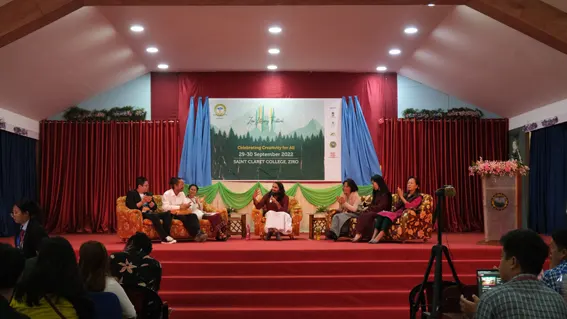ZIRO, 29 Sep: The third edition of the Ziro Literary Festival, organised by Saint Claret College, Ziro (SCCZ) and Pheonix Rising LLP, in partnership with the tribal affairs directorate, the Lower Subansiri district administration, Norphel Winery and Arunachal Organic, commenced at the SCCZ auditorium here on Thursday.
Prominent authors, writers, poets, and journalists from and outside the state, such as Mamang Dai, Madhu Raghavendra, Karma Paljor, Ranju Dodum, Ponung Ering Angu, Sadiq Naqvi and Subi Taba, besides a host of students of SCCZ are participating in the festival.
Themed ‘Celebrating Creativity for All’, this edition also focuses on creative expression and a series of outcome-based workshops. The festival also emphasises on the importance of reading, thinking, creating and sharing through discussions.
A series of hands-on workshops were also conducted as part of the festival.
Horticulture Secretary Koj Rinya, who along with Lower Subansiri DC Bamin Nime attended the inaugural function, in her address commended the organisers “for bringing together many prominent writers” and advised the attendees to “make the best use of the discussions and the talks delivered by the prominent leaders.”
She also commended the organisers of the Ziro Festival of Music “for their effort to make this year’s festival a single-use plastic-free festival.”
Dai spoke on “the power of telling your own story.”
“Words are travellers; words can foresee future,” she said, adding that “there is a history in every word penned down by writers, may it be beginners or prominent writers.”
She exhorted the students to be honest and genuine in their writings, and even in their private conversations, and stressed on the importance of reading to be a good writer.
During a penal discussion on ‘Writing on and from Arunachal Pradesh’, Dai spoke about the influence of Assamese literature on the writings from Arunachal Pradesh. She further said that Arunachal, being a land of many cultures that have various oral traditions, can be a reference point for many writings.
In another penal discussion, themed ‘Telling Stories from Northeast India for a Worldwide Audience’, EastMojo Editor Karma Paljor stressed on the need for journalists from the Northeast region to “step up and write stories of the region, instead of waiting for outsiders to give media representation.”
He added that “the region itself is a complex area for reporting,” and that the indigenous people can give more insights into the problems faced in the region.
Naqvi said that “incorporating a particular story with a larger narrative can grasp the attention of the mainland media, for instance, an issue of frequent floods in the region can be connected with climate change caused by various human development activities, thereby presenting a particular story in a more comprehensive and complex issue.”
The opening function featured a session of reading and performance poetry with Mamang Dai, Ponung Ering Angu, Ranju Dodum, Samudra Kajal Saikia, and Subu Taba.
Also, a book by Madhu Raghavendra, titled Going Home, was released.
Dai, Taba and Cheryl Susan Tada donated their books to the SCCZ library.



